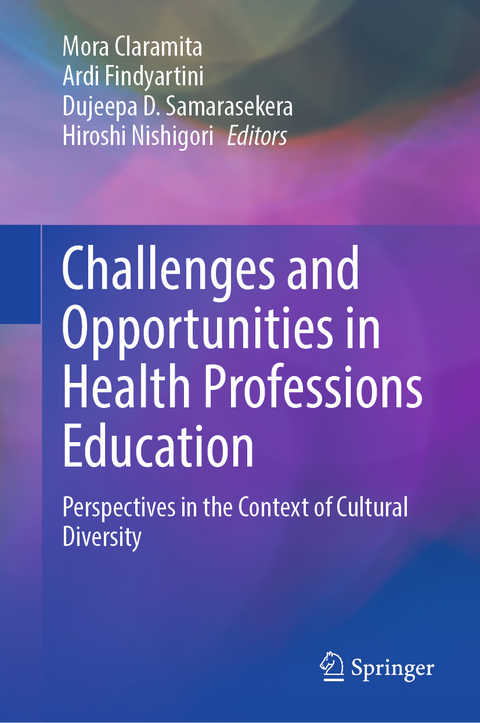
Challenges and Opportunities in Health Professions Education
Springer Verlag, Singapore
978-981-16-7231-6 (ISBN)
This book addresses health professions educational challenges specific to non-Western cultures, implementing a shifting paradigm for educating future health professionals towards patient-centered care. While health professions education has received increasing attention in the last three decades, promoting student-centered learning principles pioneered by leaders in the medical community has, for the most part, remain rooted in the Western context. Building from Hofstede’s analysis of the phenomena of cultural dimensions, which underpin the way people build and maintain their relationships with others and influence social, economic, and political well-being across nations, this book demarcates the different cultural dimensions between East and West, applied to medical education. The respective ‘hierarchical’ and ‘collectivist’ cultural dimensions are unpacked in several studies stemming from non-western countries, with the capacity to positively influence healthcare educationand services. The book provides new insights for researchers and health professional educators to understand how cultural context influences the input, processes, and output of health professionals’ education. Examples include how cultural context influences the ways in which students respond to teachers, how teachers giving feedback to students, and the challenges of peer feedback and group work. The authors also examine causes for student hesitation in proposing ideas, the pervasive cultural norm of maintaining harmony, the challenges of teamwork in clinical settings, the need to be sensitive to community health needs, the complexity of clinical decision making, and the challenge of how collectivist cultural values play into group dynamics. This book aims to advocate a more culturally-sensitive approach to educating health professionals, and will be relevant to both students and practitioners in numerous areas of public health and medical education.
Mora Claramita is a Professor and currently the Head of the Department of Medical-Health Professions Education and Bioethics, Faculty of Medicine Public-Health and Nursing, Universitas Gadjah Mada, Yogyakarta, Indonesia. She serve as the director of FAIMER Regional Institute of Indonesia (the FRIENDSHIP) and leads the Indonesia College of Health Professions Education. She has published extensively in the area of health professional-patient communication, community-based education and inter-professional education. She has received numerous national and international awards in the area of medical education and primary care, including the Lyn Clearihan Award, an Australia Fellowship Award, and a Faculty of Medicine UGM Award. She was also a Fulbright Senior Scholar. Ardi Findyartini is an Associate Professor in Medical Education and currently the Head of Department of Medical Education and Head of Medical Education Cluster - Indonesia Medical Education and Research Institute (IMERI), Faculty of Medicine Universitas Indonesia. She is a nominated panel member for ASPIRE excellence in faculty development since 2014. She authored and co-authored international publications in peer reviewed journals and conferences, peer reviewers of medical and health professions education journals, and was a lead editor and writers for Practical Guidebook for Clinical Teachers (in Indonesian), 2017. Her research area of interest includes humanism and professionalism, clinical reasoning and clinical teaching, curriculum development in undergraduate and postgraduate medical education, assessment, interprofessional education and socio-cultural factors underpinning approaches in medical and health professions education. She is the Vice Chair of Academic Affairs of the Indonesian College of Health Professions Educations. Dujeepa Samarasekera is the Senior Director, Centre for Medical Education (CenMED), Yong Loo Lin School of Medicine Singapore. Heis a visiting professor and external faculty to Tzu Chi University, Semey State Medical University and University of Maastricht. He also holds the portfolio of Director Centre for Development of Teaching and Learning at National University of Singapore. At regional and international levels Dujeepa is a council member of the World Federation of Medical Education, ASPIRE for Excellence panel in the European Association for Medical Education (AMEE) and Co-chair the Asia Pacific Scholar Network (APMENet) in medical education. He is the present President of the Western Pacific Association of Medical Education which is the regional branch organisation of the World Federation of Medical Education. Dujeepa is the Editor-in-chief of The Asia Pacific Scholar (TAPS) journal and serves on the editorial advisory boards of many other journals in medical education. Hiroshi Nishigori is a Professor at the Center for Medical Education, Nagoya University Graduate School of Medicine, and Visiting Program-Leading Professor at the Medical Education Center, Kyoto University Graduate School of Medicine, Japan. He graduated from Nagoya University School of Medicine in 1998 and became a Fellow of the Japanese Society of Internal Medicine (2004) and a Diplomat in Primary Care of the Japan Primary Care Association (2011). He obtained a Masters Degree in Medical Education from University of Dundee (2008) and a Ph.D. degree from Maastricht University (2020). His research interests include BUSHIDO and medical professionalism and Hypothesis-driven physical examination (HDPE). He is working as an editor of the Journal 'Medical Education (Japan)', and a co-chair of the APME-Net (Asian Pacific Medical Education Network)
Chapter 1. Student-centered Learning.- Chapter 2. Facilitating Learning.- Chapter 3. Learning Resources.- Chapter 4. Workplace-based Learning.- Chapter 5. Curriculum Development.- Chapter 6. Student-Assessment.- Chapter 7. Professionalism Education.- Chapter 8. Quality Assurance.- Chapter 9. Leadership.- Chapter 10. Personal and Professional Development.- Chapter 11. Interprofessional Education.- Chapter 12. Student and Faculty Well-being.- Chapter 13. Way Forward.
| Erscheinungsdatum | 18.03.2022 |
|---|---|
| Zusatzinfo | 39 Illustrations, color; 3 Illustrations, black and white; XXI, 308 p. 42 illus., 39 illus. in color. |
| Verlagsort | Singapore |
| Sprache | englisch |
| Maße | 155 x 235 mm |
| Themenwelt | Studium ► Querschnittsbereiche ► Prävention / Gesundheitsförderung |
| Sozialwissenschaften ► Kommunikation / Medien ► Kommunikationswissenschaft | |
| Sozialwissenschaften ► Pädagogik ► Berufspädagogik | |
| Schlagworte | curriculum development • healthcare professionals • health professions education • Hierarchical and Collectivism Culture • interprofessional education • medical education • Public Health |
| ISBN-10 | 981-16-7231-8 / 9811672318 |
| ISBN-13 | 978-981-16-7231-6 / 9789811672316 |
| Zustand | Neuware |
| Informationen gemäß Produktsicherheitsverordnung (GPSR) | |
| Haben Sie eine Frage zum Produkt? |
aus dem Bereich


